现在分词做状语-高中英语知识点学案
图片预览
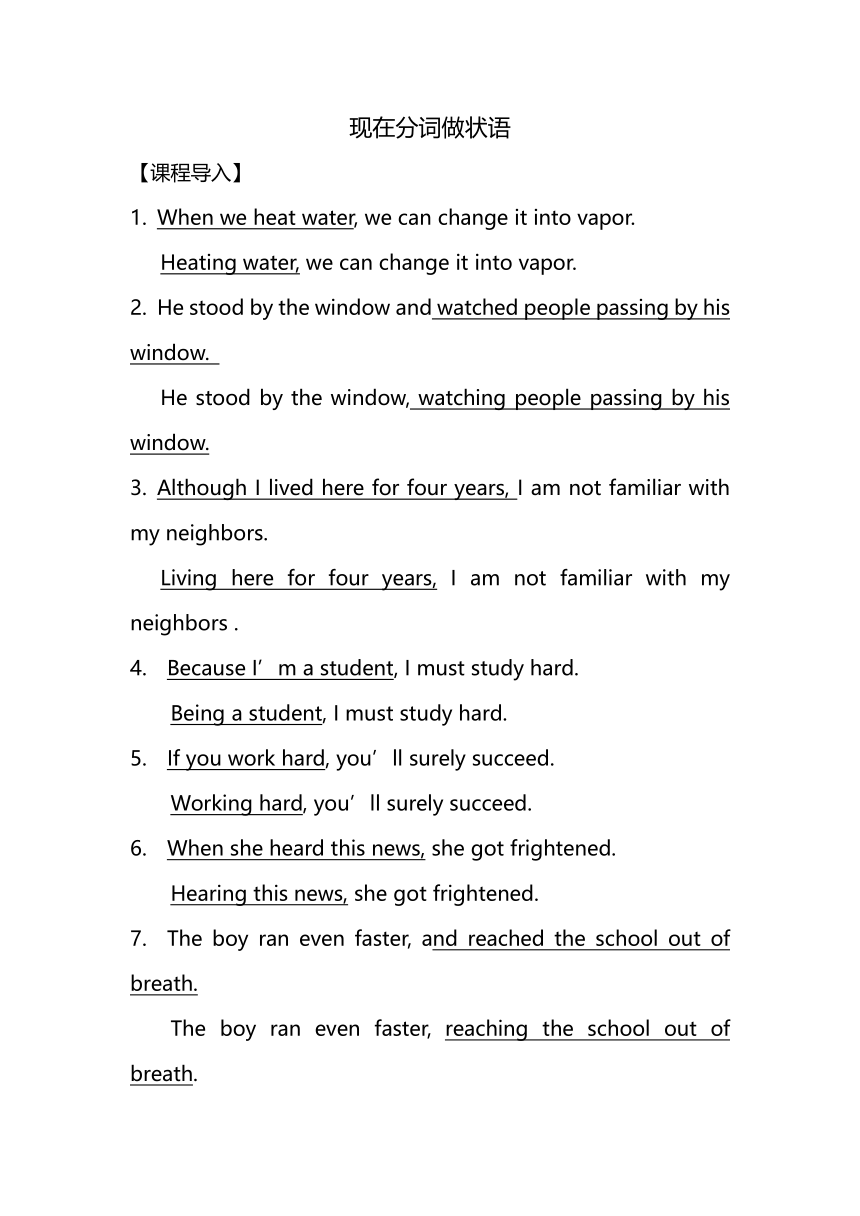
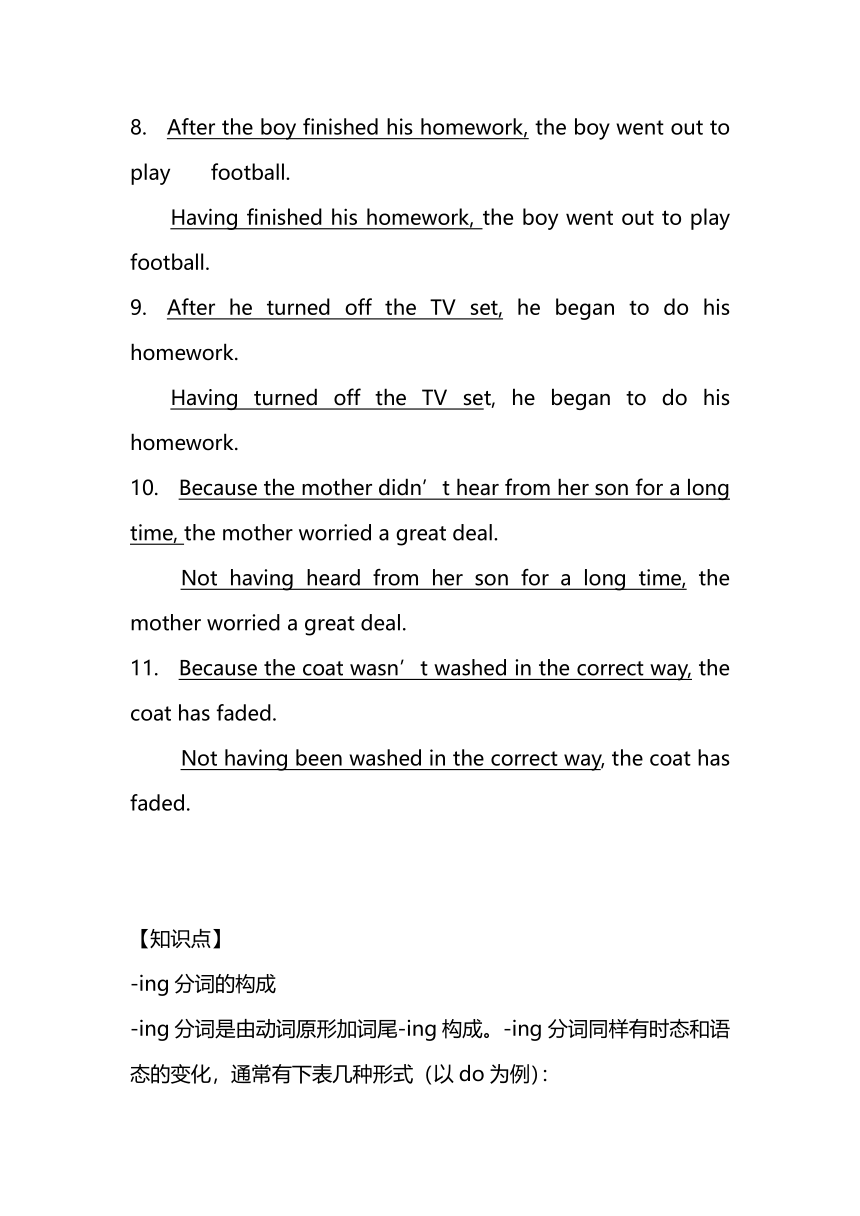
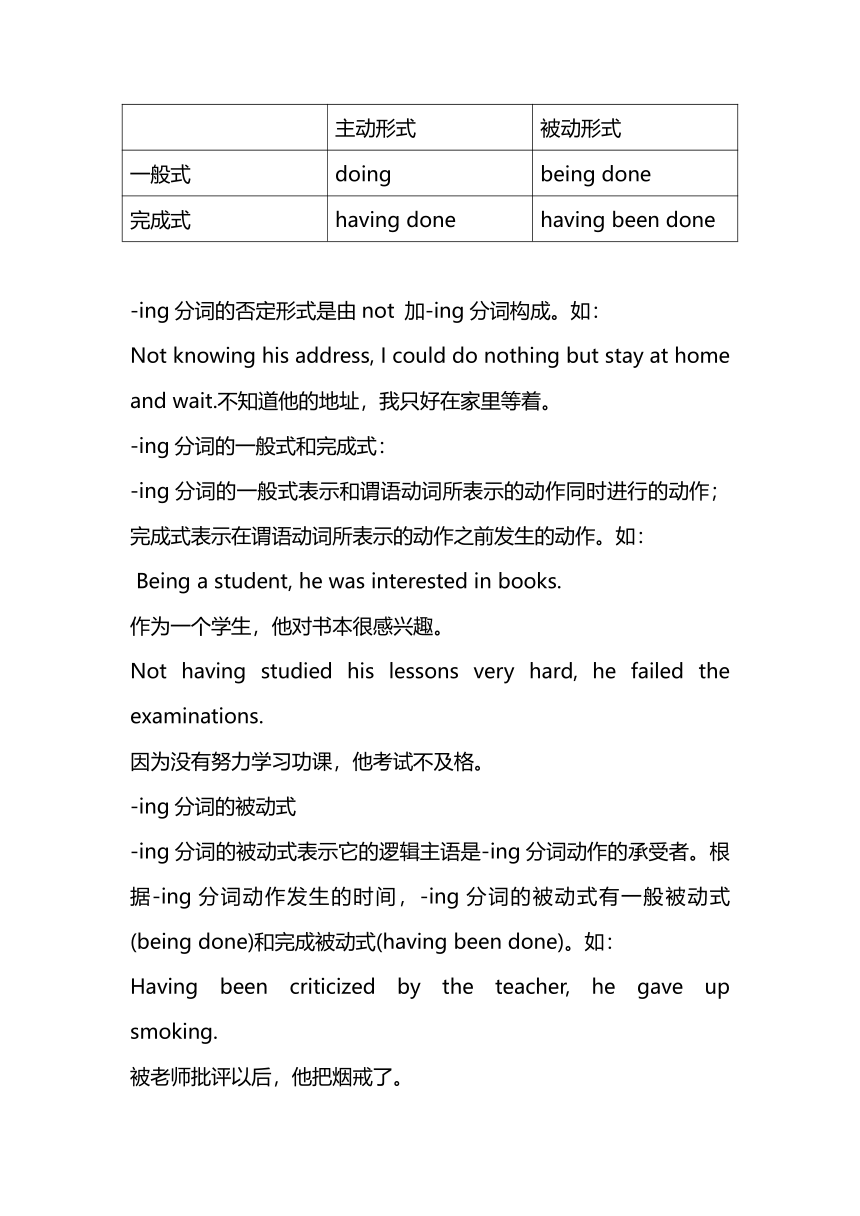
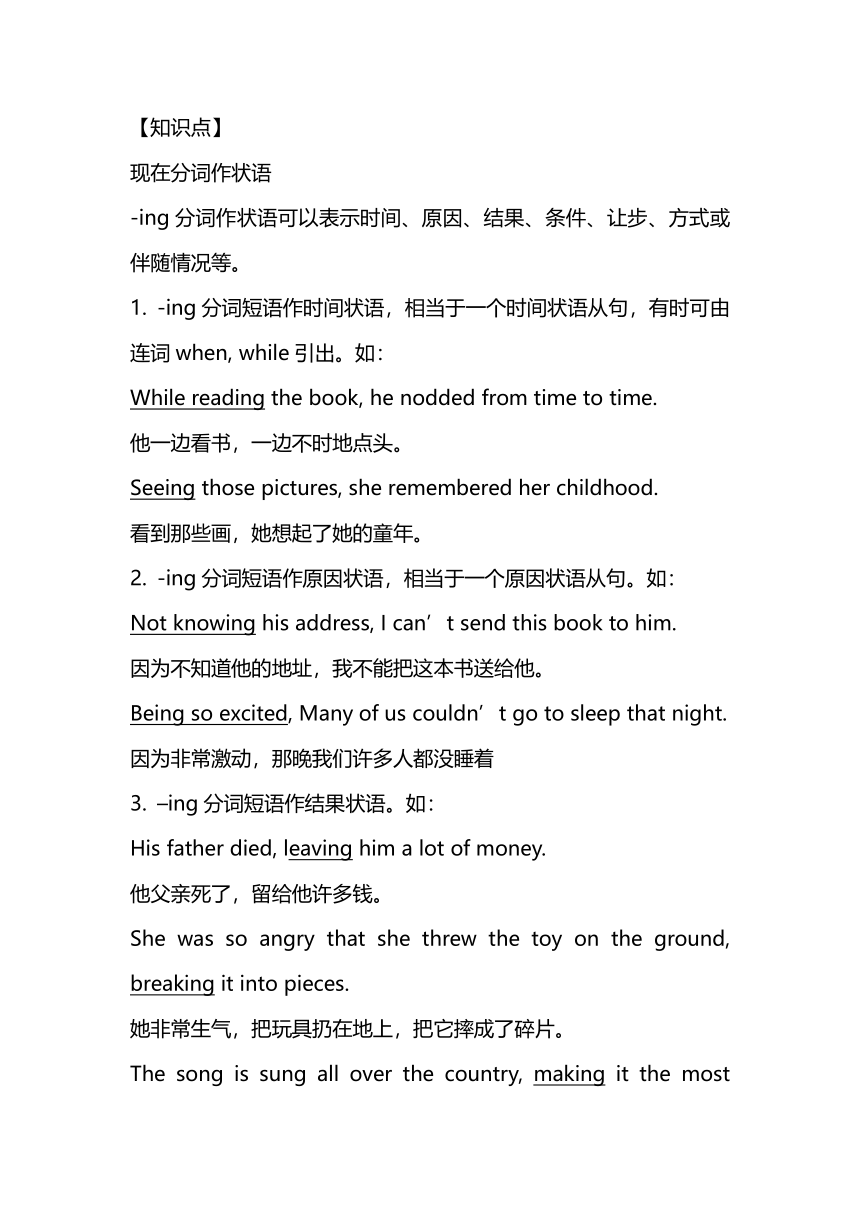
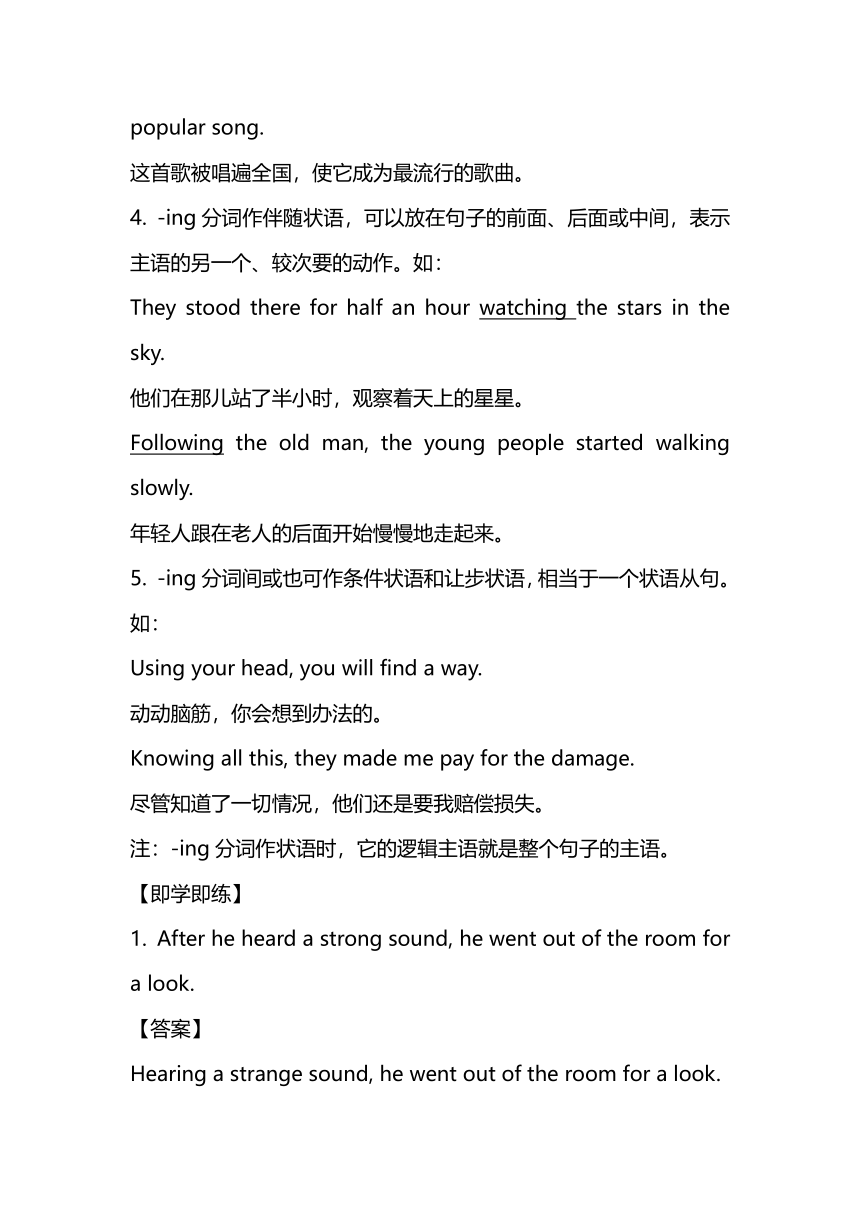
文档简介
现在分词做状语
【课程导入】
When we heat water, we can change it into vapor.
Heating water, we can change it into vapor.
He stood by the window and watched people passing by his window.
He stood by the window, watching people passing by his window.
Although I lived here for four years, I am not familiar with my neighbors.
Living here for four years, I am not familiar with my neighbors .
Because I’m a student, I must study hard.
Being a student, I must study hard.
If you work hard, you’ll surely succeed.
Working hard, you’ll surely succeed.
When she heard this news, she got frightened.
Hearing this news, she got frightened.
The boy ran even faster, and reached the school out of breath.
The boy ran even faster, reaching the school out of breath.
After the boy finished his homework, the boy went out to play football.
Having finished his homework, the boy went out to play football.
After he turned off the TV set, he began to do his homework.
Having turned off the TV set, he began to do his homework.
Because the mother didn’t hear from her son for a long time, the mother worried a great deal.
Not having heard from her son for a long time, the mother worried a great deal.
Because the coat wasn’t washed in the correct way, the coat has faded.
Not having been washed in the correct way, the coat has faded.
【知识点】
-ing分词的构成
-ing分词是由动词原形加词尾-ing构成。-ing分词同样有时态和语态的变化,通常有下表几种形式(以do为例):
主动形式
被动形式
一般式
doing
being done
完成式
having done
having been done
-ing分词的否定形式是由not 加-ing分词构成。如:
Not knowing his address, I could do nothing but stay at home and wait.不知道他的地址,我只好在家里等着。
-ing分词的一般式和完成式:
-ing分词的一般式表示和谓语动词所表示的动作同时进行的动作;完成式表示在谓语动词所表示的动作之前发生的动作。如:
?Being a student, he was interested in books.??
作为一个学生,他对书本很感兴趣。
Not having studied his lessons very hard, he failed the examinations.
因为没有努力学习功课,他考试不及格。
-ing分词的被动式
-ing分词的被动式表示它的逻辑主语是-ing分词动作的承受者。根据-ing分词动作发生的时间,-ing分词的被动式有一般被动式(being done)和完成被动式(having been done)。如:
Having been criticized by the teacher, he gave up smoking. ??????
被老师批评以后,他把烟戒了。
【知识点】
现在分词作状语
-ing分词作状语可以表示时间、原因、结果、条件、让步、方式或伴随情况等。
-ing分词短语作时间状语,相当于一个时间状语从句,有时可由连词when, while引出。如:
While reading the book, he nodded from time to time.
他一边看书,一边不时地点头。
Seeing those pictures, she remembered her childhood.?
看到那些画,她想起了她的童年。
-ing分词短语作原因状语,相当于一个原因状语从句。如:
Not knowing his address, I can’t send this book to him.??
因为不知道他的地址,我不能把这本书送给他。
Being so excited, Many of us couldn’t go to sleep that night.
因为非常激动,那晚我们许多人都没睡着
–ing分词短语作结果状语。如:
His father died, leaving him a lot of money.??
他父亲死了,留给他许多钱。
She was so angry that she threw the toy on the ground, breaking it into pieces.
她非常生气,把玩具扔在地上,把它摔成了碎片。
The song is sung all over the country, making it the most popular song.
这首歌被唱遍全国,使它成为最流行的歌曲。
-ing分词作伴随状语,可以放在句子的前面、后面或中间,表示主语的另一个、较次要的动作。如:
They stood there for half an hour watching the stars in the sky.???
他们在那儿站了半小时,观察着天上的星星。
Following the old man, the young people started walking slowly.
年轻人跟在老人的后面开始慢慢地走起来。
-ing分词间或也可作条件状语和让步状语,相当于一个状语从句。如:
Using your head, you will find a way.
动动脑筋,你会想到办法的。
Knowing all this, they made me pay for the damage.??????
尽管知道了一切情况,他们还是要我赔偿损失。
注:-ing分词作状语时,它的逻辑主语就是整个句子的主语。
【即学即练】
After he heard a strong sound, he went out of the room for a look.
【答案】
Hearing a strange sound, he went out of the room for a look.
As the girl was seriously ill, she was taken to hospital immediately.
【答案】
Being seriously ill, the girl was taken to hospital immediately.
As she didn’t know any French, she couldn’t get any one to help her.
【答案】
Not knowing any French, she couldn’t get any one to help her.
【知识点】
with/without+名词普通格或代词宾格+-ing分词”结构在句中作状语,表示伴随情况或时间、原因等。如:
His hair became grey with the years passing.??
随着时间的推移,他的头发变花白了。
Without anyone noticing, he slipped through the window.??????
没人注意,他从窗户溜了出去。
When spring comes on, the trees turned green.
Spring coming on, the trees turned green.
If time permits, we’ll visit the Great Wall.
Time permitting, we’ll visit the Great Wall.
Because her mother was ill, she had to look after her at home.
Her mother being ill, she had to look after her at home.
When he guided the blind man, they walked slowly across the street.
He guiding the blind man, they walked slowly across the street.
If weather permits, we will go out for a picnic next Sunday.
Weather permitting, we will go out for a picnic next Sunday.
独立成分:
有些分词短语可以做独立成分,用来解释整个句子,不受句子主语的限制。常见的分词短语有:generally(frankly,honestly…) speaking, supposing (假设), judging from(从…判断), talking of(谈到), speaking of(谈到)等。
Generally speaking, girls are more careful than boys.
Supposing you lose, what will you do?
Judging from his accent, he must be from the north.
Talking of travel, have you ever been to Beijing?
【即学即练】
The secretary worked late into the night,_____ a long speech for the president.
A. to prepare B. preparing
C. prepared D. was preparing
【答案】 B
European football is played in 80 countries, ______ it the most popular sport in the world.
A. making B. makes
C. made D. to make
【答案】A
Can’t you read?” Mary said ______ to the notice.
A. angrily pointing B. and point angrily
C. angrily pointed D. and angrily pointing
【答案】A
______ a reply, he decided to write again.
A.Not receiving
B. Receiving not
C.Not having received
D. Having not received
【答案】C
The missing singer was last seen ____ the voice close to the bridge.
A.exercising B.to be exercising
C.exercise D.to exercise
【答案】A
The directors discussed the project that they would like to see ____ the next year.
A.carry out B.carrying out
C.carried out D.to carry out
【答案】C
__________?the classroom, the students went to the playground to watch the football match.
A. To clean?????????? B. Having cleaned?? ???
Cleaned??????????? D. Cleaning
【答案】B
When I got back home I saw a message pinned to the door ________"Sorry to miss you; will call later.“
read B. reads C. to read D. reading
【答案】D
________from what he said, he must be the thief who has stolen the car.
Judging B. Judged C. To judge D. Judge
【答案】A
10.________for the terrible accident, as the public thought, the mayor felt nervous and was at a loss what to do.
A. Having blamed B. To blame
C. Being to be blame D. Being to blame
【答案】D
11.We slept with the light________ all night long last night.
A. burnt B. to burn C. being burnt D. burning
【答案】D
12.________her mother had come, her face lit up.
A. Hearing B. Having heard
C. When hearing D. When she heard
【答案】D
【课程导入】
When we heat water, we can change it into vapor.
Heating water, we can change it into vapor.
He stood by the window and watched people passing by his window.
He stood by the window, watching people passing by his window.
Although I lived here for four years, I am not familiar with my neighbors.
Living here for four years, I am not familiar with my neighbors .
Because I’m a student, I must study hard.
Being a student, I must study hard.
If you work hard, you’ll surely succeed.
Working hard, you’ll surely succeed.
When she heard this news, she got frightened.
Hearing this news, she got frightened.
The boy ran even faster, and reached the school out of breath.
The boy ran even faster, reaching the school out of breath.
After the boy finished his homework, the boy went out to play football.
Having finished his homework, the boy went out to play football.
After he turned off the TV set, he began to do his homework.
Having turned off the TV set, he began to do his homework.
Because the mother didn’t hear from her son for a long time, the mother worried a great deal.
Not having heard from her son for a long time, the mother worried a great deal.
Because the coat wasn’t washed in the correct way, the coat has faded.
Not having been washed in the correct way, the coat has faded.
【知识点】
-ing分词的构成
-ing分词是由动词原形加词尾-ing构成。-ing分词同样有时态和语态的变化,通常有下表几种形式(以do为例):
主动形式
被动形式
一般式
doing
being done
完成式
having done
having been done
-ing分词的否定形式是由not 加-ing分词构成。如:
Not knowing his address, I could do nothing but stay at home and wait.不知道他的地址,我只好在家里等着。
-ing分词的一般式和完成式:
-ing分词的一般式表示和谓语动词所表示的动作同时进行的动作;完成式表示在谓语动词所表示的动作之前发生的动作。如:
?Being a student, he was interested in books.??
作为一个学生,他对书本很感兴趣。
Not having studied his lessons very hard, he failed the examinations.
因为没有努力学习功课,他考试不及格。
-ing分词的被动式
-ing分词的被动式表示它的逻辑主语是-ing分词动作的承受者。根据-ing分词动作发生的时间,-ing分词的被动式有一般被动式(being done)和完成被动式(having been done)。如:
Having been criticized by the teacher, he gave up smoking. ??????
被老师批评以后,他把烟戒了。
【知识点】
现在分词作状语
-ing分词作状语可以表示时间、原因、结果、条件、让步、方式或伴随情况等。
-ing分词短语作时间状语,相当于一个时间状语从句,有时可由连词when, while引出。如:
While reading the book, he nodded from time to time.
他一边看书,一边不时地点头。
Seeing those pictures, she remembered her childhood.?
看到那些画,她想起了她的童年。
-ing分词短语作原因状语,相当于一个原因状语从句。如:
Not knowing his address, I can’t send this book to him.??
因为不知道他的地址,我不能把这本书送给他。
Being so excited, Many of us couldn’t go to sleep that night.
因为非常激动,那晚我们许多人都没睡着
–ing分词短语作结果状语。如:
His father died, leaving him a lot of money.??
他父亲死了,留给他许多钱。
She was so angry that she threw the toy on the ground, breaking it into pieces.
她非常生气,把玩具扔在地上,把它摔成了碎片。
The song is sung all over the country, making it the most popular song.
这首歌被唱遍全国,使它成为最流行的歌曲。
-ing分词作伴随状语,可以放在句子的前面、后面或中间,表示主语的另一个、较次要的动作。如:
They stood there for half an hour watching the stars in the sky.???
他们在那儿站了半小时,观察着天上的星星。
Following the old man, the young people started walking slowly.
年轻人跟在老人的后面开始慢慢地走起来。
-ing分词间或也可作条件状语和让步状语,相当于一个状语从句。如:
Using your head, you will find a way.
动动脑筋,你会想到办法的。
Knowing all this, they made me pay for the damage.??????
尽管知道了一切情况,他们还是要我赔偿损失。
注:-ing分词作状语时,它的逻辑主语就是整个句子的主语。
【即学即练】
After he heard a strong sound, he went out of the room for a look.
【答案】
Hearing a strange sound, he went out of the room for a look.
As the girl was seriously ill, she was taken to hospital immediately.
【答案】
Being seriously ill, the girl was taken to hospital immediately.
As she didn’t know any French, she couldn’t get any one to help her.
【答案】
Not knowing any French, she couldn’t get any one to help her.
【知识点】
with/without+名词普通格或代词宾格+-ing分词”结构在句中作状语,表示伴随情况或时间、原因等。如:
His hair became grey with the years passing.??
随着时间的推移,他的头发变花白了。
Without anyone noticing, he slipped through the window.??????
没人注意,他从窗户溜了出去。
When spring comes on, the trees turned green.
Spring coming on, the trees turned green.
If time permits, we’ll visit the Great Wall.
Time permitting, we’ll visit the Great Wall.
Because her mother was ill, she had to look after her at home.
Her mother being ill, she had to look after her at home.
When he guided the blind man, they walked slowly across the street.
He guiding the blind man, they walked slowly across the street.
If weather permits, we will go out for a picnic next Sunday.
Weather permitting, we will go out for a picnic next Sunday.
独立成分:
有些分词短语可以做独立成分,用来解释整个句子,不受句子主语的限制。常见的分词短语有:generally(frankly,honestly…) speaking, supposing (假设), judging from(从…判断), talking of(谈到), speaking of(谈到)等。
Generally speaking, girls are more careful than boys.
Supposing you lose, what will you do?
Judging from his accent, he must be from the north.
Talking of travel, have you ever been to Beijing?
【即学即练】
The secretary worked late into the night,_____ a long speech for the president.
A. to prepare B. preparing
C. prepared D. was preparing
【答案】 B
European football is played in 80 countries, ______ it the most popular sport in the world.
A. making B. makes
C. made D. to make
【答案】A
Can’t you read?” Mary said ______ to the notice.
A. angrily pointing B. and point angrily
C. angrily pointed D. and angrily pointing
【答案】A
______ a reply, he decided to write again.
A.Not receiving
B. Receiving not
C.Not having received
D. Having not received
【答案】C
The missing singer was last seen ____ the voice close to the bridge.
A.exercising B.to be exercising
C.exercise D.to exercise
【答案】A
The directors discussed the project that they would like to see ____ the next year.
A.carry out B.carrying out
C.carried out D.to carry out
【答案】C
__________?the classroom, the students went to the playground to watch the football match.
A. To clean?????????? B. Having cleaned?? ???
Cleaned??????????? D. Cleaning
【答案】B
When I got back home I saw a message pinned to the door ________"Sorry to miss you; will call later.“
read B. reads C. to read D. reading
【答案】D
________from what he said, he must be the thief who has stolen the car.
Judging B. Judged C. To judge D. Judge
【答案】A
10.________for the terrible accident, as the public thought, the mayor felt nervous and was at a loss what to do.
A. Having blamed B. To blame
C. Being to be blame D. Being to blame
【答案】D
11.We slept with the light________ all night long last night.
A. burnt B. to burn C. being burnt D. burning
【答案】D
12.________her mother had come, her face lit up.
A. Hearing B. Having heard
C. When hearing D. When she heard
【答案】D
同课章节目录
- 名词
- 动词/动词短语
- 一般现在时及其被动式
- 一般过去时及其被动式
- 现在进行时及其被动式
- 过去进行时及其被动式
- 将来进行时及其被动式
- 现在完成时及其被动式
- 过去完成时及其被动式
- 一般将来时及其被动式
- 过去将来时及其被动式
- 现在完成进行时及其被动式
- 将来完成时及其被动式
- 副词
- 介词/介词短语
- 连词/连接词
- 数词/量词
- 冠词
- 形容词
- 非谓语动词
- 句型
- 简单句与并列句
- 复合句
- 主谓一致
- 倒装与省略
- 强调句
- 虚拟语气
- 插入语
- 固定句型
- 祈使句/感叹句
- 疑问句/反义疑问句
- 非限制性定语从句
- 句型转换
- 定语从句
- 表语从句
- 宾语从句
- 主语从句
- 动词时态与语态
- 虚拟语气与情态动词
- 主谓一致
- 独立主格结构、with的复合结构
- 情态动词
- 状语从句
- 定语从句
- 特殊句式
- 交际用语
- 代词/不定代词
- 名词性从句
- 同位语从句
- 表语从句
- 宾语从句
- 主语从句
- 直接引语和间接引语
- 构词法(word formation)
